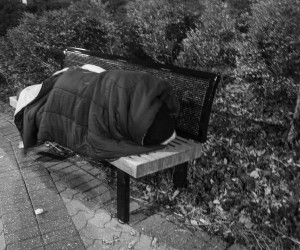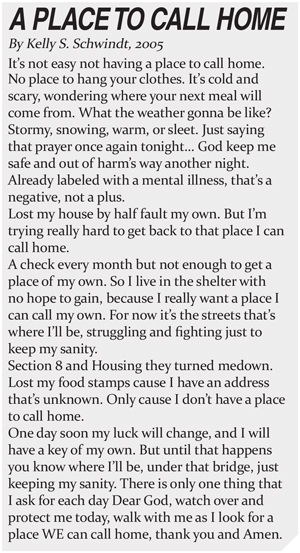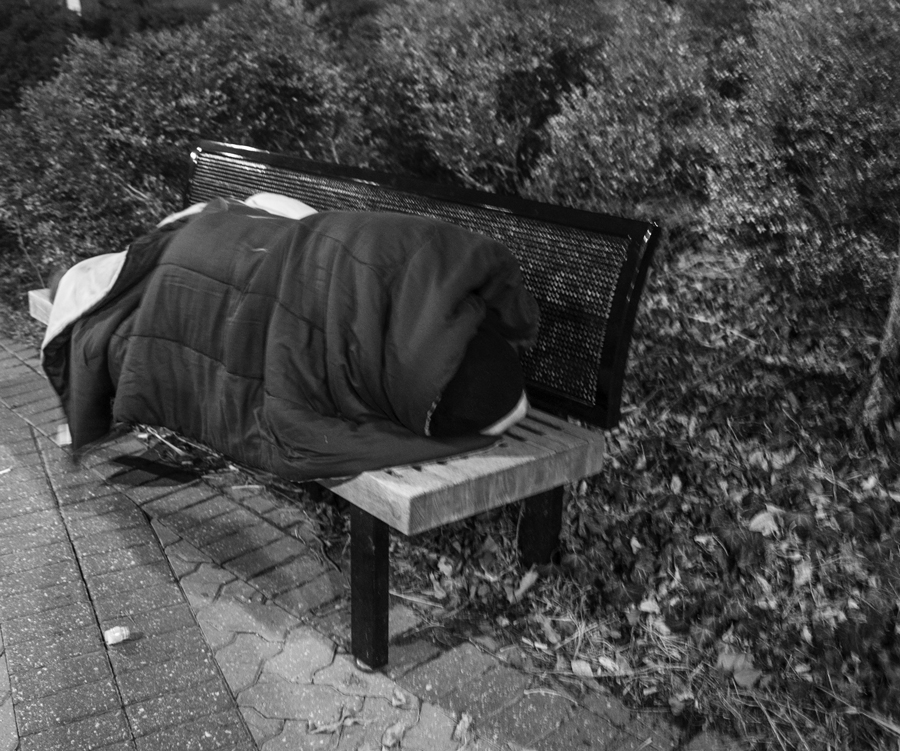By Jon Parton
On a Sunday morning, the homeless and the needy stood in line for a warm meal at the Wilhelmina Gill Center in Kansas City, Kan. An elderly woman dressed in a dirty oversized jean jacket bared a toothless smile as she stood in line.

“God is good,” she said. “God is good.”
The woman did not have long to wait, as the people in front of her ushered her ahead in line. An unwritten rule says that the youngest and oldest are first to be served. According to James Harrison, one of the homeless visiting the center, poverty means looking out for one another.
Harrison, 33, said he has been living on and off the streets since high school.
“When I first came here from Manhattan, I kind of had a place to stay with my uncle,” he said. “But everybody wants money. And if you ain’t got no money, it takes a long time to make some money and find a job.”
The center is one of many attending to Kansas City’s local homeless population. In Johnson County alone, the public school districts reported more than 1,100 students classified as homeless last year. That number represents 13 percent of all homeless youths in the state of Kansas.
According to David Burch, volunteer at the Wilhelmina Gill Center, demand has been on the rise since he first started four years ago.
“We’re open seven days a week,” Burch said. “We always have people coming in.”
 The center also offers hygiene products, free health screenings and a survival skills workshop for women. In addition, the center offers short-term monetary assistance and even mediation programs for families facing eviction and utility termination notices.
The center also offers hygiene products, free health screenings and a survival skills workshop for women. In addition, the center offers short-term monetary assistance and even mediation programs for families facing eviction and utility termination notices.
Burch said the center helps provide more than just food to the local homeless.
“We set up a voicemail system for people without phones so they can list a phone number on a job application,” Burch said. “We provide people an address or P.O. box so they have a place where they can pick up their food stamps.”
Leo Easterwood is a former police officer with the KCK Police Department. He was assigned to the center as part of his beat but continued to provide security after his retirement. While sitting to talk, Easterwood was greeted by a few visitors.
“I’ve been here about 15 years,” Easterwood said. “I’m the kind of person who is, if I’m given a job, then I’ll stay there and stick with it until something else happens. And I guess you might say I’ve been here so long, I’ve got a rapport with the people.”
Easterwood said his ongoing presence provides a sense of stability for visitors to the center.
“A lot of these people have mental problems,” Easterwood said. “Whether it’s from alcohol, drugs or a combination of mental challenges and they don’t know how to react in any given case to any given thing. So it has to be someone who can kind of, you know, bring them to themselves and let them understand that everyone’s not their enemy.”
Although the number of homeless visiting the center has increased in recent years, Easterwood said he has seen a lot of people move forward with their lives.
“We’ve had people come in here who literally have nothing,” Easterwood said. “Shirts on their backs. But they had enough about them that they wanted to do more. I’ve known people that leave here and come back just to see the people and help.”
Easterwood said aside from mental health problems, drugs have also played a role in the current homeless situation in Kansas City.
“A lot of people who come here, we’ve had ex-police officers who lost their job because of drugs,” Easterwood said. “We’ve had probation officers who lost their job because of drugs. We’ve had a number of people with multiple degrees lost their jobs because of drugs.”
Harrison said drugs are a daily routine among a lot of homeless.
“It’s the lifestyle, so to speak,” Harrison said. “Now yes, I do indulge in drug activity. I sell it, smoke it, sniff it, whatever it is. It’s around me everyday. In a sense, I guess you could say I’m an addict. Consuming it with a certain person, just even interacting with somebody can get you a benefit. It’s just building rapport. Drugs aren’t the best thing to be doing, but I do.”
Harrison said his addiction began before he was born, as his mother took various drugs while she was pregnant with him. Harrison pointed to his mother, standing no more than twenty feet away carrying a tray of food.
“My mom’s been smoking since before I was born,” Harrison said. “She doesn’t like anything but that. She’ll run down anybody to get it now. It’s consumed her soul.”
Contact Jon Parton, managing editor, at [email protected].






















